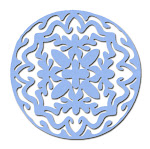




Percolating with ideas for Lisbeth's big new cuts. I'm particularly keen on this design...
Wouldn't these make great tiles? Or fabric squares...
I pulled my palette from a couple of photos of bouquets from last summer's flower gardens...









 Lisbeth and Milkweed enjoying a visit from Brother Alec (Lis-ism) who now lives in Long Beach. Alec has been in Maine for ten days and flies back to California today. Lisbeth will miss her "little" brother. Sometime when I have more skin on (this has been a particularly rough week for Lisbeth) I will write about my experience of the difficulties faced by siblings of children with special needs. I could write volumes. But not today. For today I'll just say that there are indeed extreme challenges for these siblings, and in living with a "special" brother or sister, they become deeply wise.
Lisbeth and Milkweed enjoying a visit from Brother Alec (Lis-ism) who now lives in Long Beach. Alec has been in Maine for ten days and flies back to California today. Lisbeth will miss her "little" brother. Sometime when I have more skin on (this has been a particularly rough week for Lisbeth) I will write about my experience of the difficulties faced by siblings of children with special needs. I could write volumes. But not today. For today I'll just say that there are indeed extreme challenges for these siblings, and in living with a "special" brother or sister, they become deeply wise.






 With the Risperdol decrease, Lisbeth's paper cutting is getting more and more fine tuned, more like the way she used to cut. These days she prefers to use a pizza pan to trace the circle for "the giant snowflakes." Even the simplist of these cuts would make beautiful tiles, or striking fabric designs. I'm planning to create some new fabric soon on Spoonflower, using some of these "new cuts."
With the Risperdol decrease, Lisbeth's paper cutting is getting more and more fine tuned, more like the way she used to cut. These days she prefers to use a pizza pan to trace the circle for "the giant snowflakes." Even the simplist of these cuts would make beautiful tiles, or striking fabric designs. I'm planning to create some new fabric soon on Spoonflower, using some of these "new cuts." 
 Lisbeth and I made some crayon "valens" (Lis-ism) in my studio yesterday. Then Lis decided to make "a cut" from the colorful waxed paper, too...
Lisbeth and I made some crayon "valens" (Lis-ism) in my studio yesterday. Then Lis decided to make "a cut" from the colorful waxed paper, too... Flower Angel, cut February 2, 2012.
Flower Angel, cut February 2, 2012. One of Lisbeth's exquisitely intricate mandalas from around 2006.
One of Lisbeth's exquisitely intricate mandalas from around 2006. Lisbeth in my studio, admiring her latest "cut," a butterfly...
Lisbeth in my studio, admiring her latest "cut," a butterfly... Butterfly Cut, by Lisbeth
Butterfly Cut, by Lisbeth
 My mother, Edna Simmons, with her grandchildren Andrew and Kaitlyn looking on as she holds her newest grandchild, Lisbeth, in November, 1981.
My mother, Edna Simmons, with her grandchildren Andrew and Kaitlyn looking on as she holds her newest grandchild, Lisbeth, in November, 1981.


